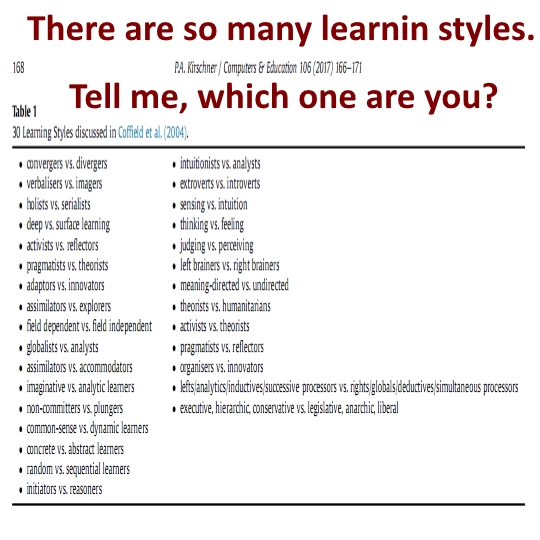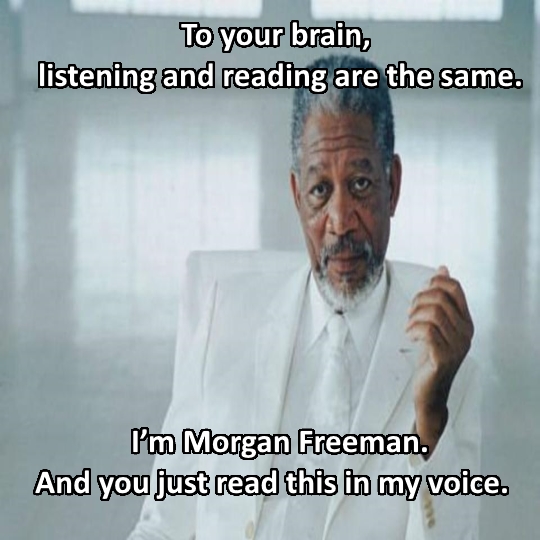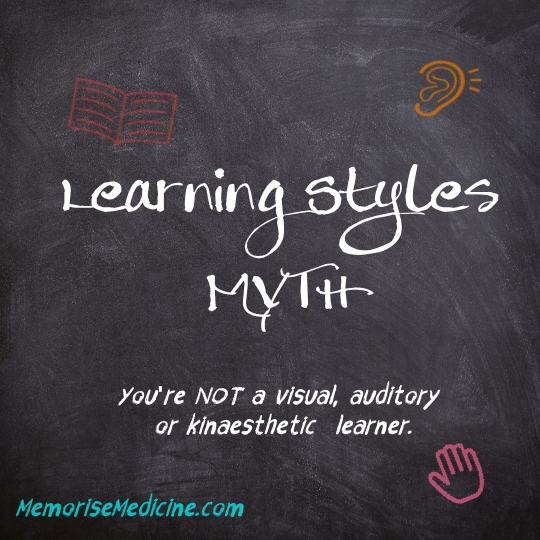Until Uni restarts, I think I’ll take a break from medicine information post. Because it’s the holidays and you’ve already spent a lot of time studying and cramming for your exams.
“No need to learn new information!” you’re thinking. “I’m already starting to forget what I learnt last semester!”
And that’s a problem. So let’s look at the first half our name, Memorise, and the concepts and techniques that will help you retain what you learn.
Let’s first see what doesn’t work.
Learning Styles
“You will learn better when presenting information in your preferred learning style.” This is a common belief, that according to a 2012 study, 93% and 96% of teachers in the UK and Netherlands respectively believe[1].
The most common learning styles touted are visual (reading), auditory (listening) or kinaesthetic (hands-on) but there are actually 30 or more. On the surface this makes sense, people are different. Some like to get involved, others like to listen and others might prefer to read. So why not teach and learn according to what you’re?


Because it’s a myth!
But we can’t fault teachers for believing this. “89% of recent research papers… implicitly or directly endorse the use of Learning Styles in Higher Education[2]” no wonder so many teachers believe this myth.
I won’t go into detail about why it’s a myth. If you’re interested read, “Stop propagating the learning styles myth” [3].
I’ll just summarise the studies with this quote”
“there is no adequate evidence base to justify incorporating learning-styles assessments into general educational practice[3],[4].”
How Does This Help Me Learn Medicines?
Good question! Well, for one, I just save you a lot of time. You now know you don’t need to spend time figuring out and optimising your learning style. But you might be thinking “but I was never going to spend a lot of time doing that… everyone knows I’m a visual learner.” Alright visual learner, let’s see what you can do instead.
First, let’s look at a study that helped bust the myth of learning styles. In this study[5] they investigated the effect of auditory (listening) and visual (reading) learning styles on comprehension.
What they found was there was no difference between learning styles and comprehension. This is a fine way to show that learning styles don’t matter. But it also reveals an important study tip. I.e. Listening to study material will give the same level of understanding as reading it.
Or to quote cognitive psychologist, Daniel Willingham “For most books, for most purposes, listening and reading are more or less the same thing.[6]”

This is a powerful message when it comes to learning. As there are many times where you are not able to read but you can listen.
Let utilises this principle in three simple steps.
- Next time you read your study notes, say them out loud while you record yourself.
- Listen to your recording (or Uni recorded lecture). Do this anywhere and everywhere E.g. when you have to commute to work, in between lectures, while walking your dog, when someone is annoying you.
- Get the same benefits you would have got from reading the notes.
And what’s even better, for the low price of $999.99, you can have me read out your notes! Jokes. This is not a feature of Memorise Medicine… yet.
Bonus tip: Depending on how complex the topic is, you can listen to at up to 1.8x the speed! [7]. Talk about a time saver! But it’s actually called time compression.
Note: You’ll be surprised at how fast your brain gets use to time compression. I listen to all my audiobooks this way and the normal speed is just too slow now. But don’t go crazy increasing the speed. A small study showed 1.5x had detrimental or no significant effect on learning novel material [8].

References
[1] Dekker S, Lee NC, Howard-Jones P, Jolles J. Neuromyths in Education: Prevalence and Predictors of Misconceptions among Teachers. Front Psychol. 2012 Oct 18;3:429. doi: 10.3389/fpsyg.2012.00429. eCollection 2012.
[2] Newton P. The Learning Styles Myth is Thriving in Higher Education. Front Psychol. 2015;6:1908. Published 2015 Dec 15. doi:10.3389/fpsyg.2015.01908
[3] Kirschner, PA. (2017). Stop propagating the learning styles myth. Computers & Education 106 (2017) 166e171
[4] Pashler H, McDaniel M, Rohrer D, Bjork R. Learning Styles: Concepts and Evidence. Psychol Sci Public Interest. 2008 Dec;9(3):105-19. doi: 10.1111/j.1539-6053.2009.01038.x. Epub 2008 Dec 1.
[5] Rogowsky, Beth A.,Calhoun, Barbara M.,Tallal, Paula. Matching learning style to instructional method: Effects on comprehension. Journal of Educational Psychology, Vol 107(1), Feb 2015, 64-78
[6] http://www.danielwillingham.com/daniel-willingham-science-and-education-blog/is-listening-to-an-audio-book-cheating
[7] Pastore, R. & Ritzhaupt, A.D. TECHTRENDS TECH TRENDS (2015) 59: 66. https://doi.org/10.1007/s11528-015-0841-2
[8] Song K, Chakraborty A, Dawson M, Dugan A, Adkins B, Doty C. Does the Podcast Video Playback Speed Affect Comprehension for Novel Curriculum Delivery? A Randomized Trial. West J Emerg Med. 2017;19(1):101-105.